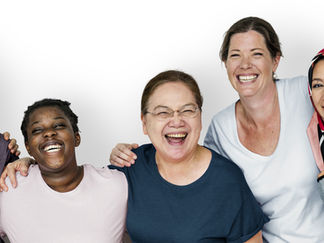Stop the fight
Normalise your appetite
"You are finally free—no more guilt, no more diets, just trust in your body’s wisdom; Intuitive Eating is your path to nourishment, joy and lasting peace with food."
"Every bite you take with awareness and self-compassion is a step toward healing—you're not just fixing your eating; you're reclaiming your power and your life."
Customer
Success stories
Inuitive Eating Happiness
I was a chronic binge eater, thinking I was just greedy, lazy and disgusting – not knowing all of this had come from the years of dieting that I had done since the age of 11. I’d implore anyone dealing with the same issues to get in touch with Alison and start your Intuitive Eating journey. It’s by far, the best thing I’ve ever done for my happiness.
Thank you, Alison
Thank you, Alison for supporting me with such kindness, respect, compassion and knowledge in my intuitive eating journey. I am still putting into my daily life the concepts we deeply studied and practiced together and I can feel the freedom of living my life intuitively. Thank you again
Step 1
Binging stops
Step 2
Overeating stops
Step 3
Eating Preferences Change
Food success in
3 Simple Steps
With the support of your Intuitive Eating Counsellor, success is achieved in just 3 steps.
This is
my story
I'm Alison, a qualified Intuitive Eating counsellor
I need to talk about what it’s like to live with an uncontrollable appetite—before I forget just how devastating it really was. For years, I believed my eating struggles were a sign of weakness or personal failure. I gave it everything—motivation, knowledge, willpower—but no matter how hard I tried, I always ended up back in the same cycle: shame, exhaustion, and self-blame. People joked about how much I “loved food,” but they didn’t see the pain. I didn’t love food—I was at war with it. From childhood to the age of 40, I was what many would call “an overeater.” Now I know better. No one is an “overeater.” It’s not an identity—it’s a symptom of something much deeper: the loss of natural, instinctive appetite control. I’d spent my career as a personal trainer and nutrition expert, but none of it helped me stop eating when I wasn’t hungry. In fact, the more I tried to control my appetite, the worse it got. Willpower, I discovered, doesn’t work with instincts. Appetite isn’t a behaviour like smoking—it’s a biological instinct, meant to run on autopilot. But when you try to override it with restriction and rules, it backfires. Rebound eating. Constant cravings. Food chatter that never stops. It drained my energy, affected my relationships, and shaped major life decisions—including not having children, because I couldn’t face passing on what I hadn’t resolved myself. Recovery didn’t come quickly. It’s taken me nearly 20 years to restore my appetite to normal—to feel hunger and fullness again, to feel peace. But now, I’m free. Eating is effortless. Exercise is instinctive. My brain is no longer hijacked by food. I feel like myself again—focused, calm, and finally living. That’s what I help others do now: move from willpower to instinct, from struggle to ease. And if I can do it, so can you.

About The Appetite Club
Can I book a free session before signing up for a paid-for membership?
About The Appetite Club
Who is the Appetite Club for?
About The Appetite Club
What is the Appetite Club?
About The Appetite Club
What are the The Appetite Club Memberships
You are Not to Blame
Who can I blame for my overeating?
You are Not to Blame
What causes overeating?
Questions about Eating
How can I still be dieting if I am just doing “healthy eating”?
Questions about Eating
How much should I eat?
Questions about Eating
If I don’t feel hungry, does that mean I am not hungry?
Questions about Eating
How long does it take to get a normal appetite?
Questions about Eating
Why do I binge?
Questions about Eating
Why do I feel like food is my best friend?
Questions about Eating
Why do I get “triggered” to eat when I see food?
Questions about Eating
Why can’t I stop eating once I start?
Questions about Eating
Why can’t I stick to a diet?
Questions about Eating
Am I passing on bad habits to my children?
Appetite Normalisation
How does appetite normalisation work?
Appetite Normalisation
What will having a normal appetite do for me?
Appetite Normalisation
What is “Appetite Normalisation”?
My Appetite
What is a sweet-tooth?
My Appetite
Do I have a large appetite?
My Appetite
What is a normal appetite?
My Appetite
What is My “Appetite.”?
My Appetite
What is a craving?
My Appetite
What’s wrong with trying to change my appetite using willpower?
My Appetite
Why do some people have large appetites?
Weight Loss
What is Intentional versus Unintentional Weight Loss?
Weight Loss
Yes but, will I lose weight!?
Weight Loss
Yes but, weight loss will inspire me to keeping eating in the new way…
Weight Loss
What about weight loss injections?
Weight Loss
Where is the Proof this Works
Weight Loss
Why is this not about weight loss?
Weight Loss
What is so wrong with Intentional Weight Loss?
Weight Loss
Why intentional weight loss methods don’t work (and this unintentional weight loss method does)?
Weight Loss
I’ve lost weight before, I can do it again….
Weight Loss
Yes but, I am desperate!
Getting Support
How Can The Appetite Club Help Me?
The Appetite Blog
Whet your appetite
Contact Us
Email: Use the form the below
Call: 07799 621456








